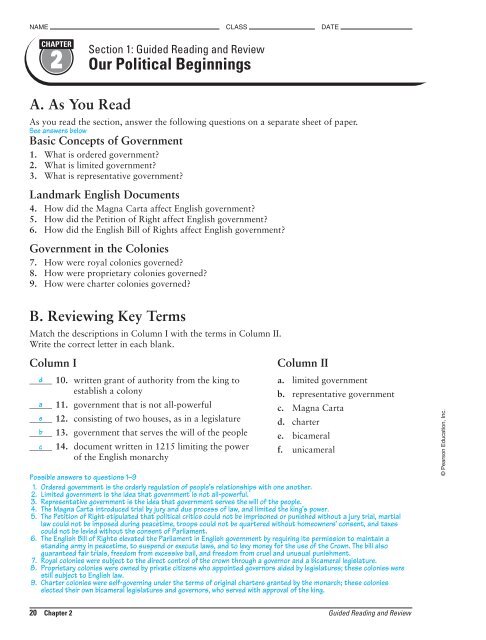0130679593
0130679593
0130679593
You also want an ePaper? Increase the reach of your titles
YUMPU automatically turns print PDFs into web optimized ePapers that Google loves.
NAME CLASS DATE<br />
CHAPTER<br />
2<br />
Section 1: Guided Reading and Review<br />
Our Political Beginnings<br />
A. As You Read<br />
As you read the section, answer the following questions on a separate sheet of paper.<br />
See answers below<br />
Basic Concepts of Government<br />
1. What is ordered government?<br />
2. What is limited government?<br />
3. What is representative government?<br />
Landmark English Documents<br />
4. How did the Magna Carta affect English government?<br />
5. How did the Petition of Right affect English government?<br />
6. How did the English Bill of Rights affect English government?<br />
Government in the Colonies<br />
7. How were royal colonies governed?<br />
8. How were proprietary colonies governed?<br />
9. How were charter colonies governed?<br />
B. Reviewing Key Terms<br />
Match the descriptions in Column I with the terms in Column II.<br />
Write the correct letter in each blank.<br />
Column I<br />
_____ d 10. written grant of authority from the king to<br />
establish a colony<br />
_____ a 11. government that is not all-powerful<br />
_____ e 12. consisting of two houses, as in a legislature<br />
_____ b 13. government that serves the will of the people<br />
_____ c 14. document written in 1215 limiting the power<br />
of the English monarchy<br />
Column II<br />
a. limited government<br />
b. representative government<br />
c. Magna Carta<br />
d. charter<br />
e. bicameral<br />
f. unicameral<br />
Possible answers to questions 1–9<br />
1. Ordered government is the orderly regulation of people’s relationships with one another.<br />
2. Limited government is the idea that government is not all-powerful.<br />
3. Representative government is the idea that government serves the will of the people.<br />
4. The Magna Carta introduced trial by jury and due process of law, and limited the king’s power.<br />
5. The Petition of Right stipulated that political critics could not be imprisoned or punished without a jury trial, martial<br />
law could not be imposed during peacetime, troops could not be quartered without homeowners’ consent, and taxes<br />
could not be levied without the consent of Parliament.<br />
6. The English Bill of Rights elevated the Parliament in English government by requiring its permission to maintain a<br />
standing army in peacetime, to suspend or execute laws, and to levy money for the use of the Crown. The bill also<br />
guaranteed fair trials, freedom from excessive bail, and freedom from cruel and unusual punishment.<br />
7. Royal colonies were subject to the direct control of the crown through a governor and a bicameral legislature.<br />
8. Proprietary colonies were owned by private citizens who appointed governors aided by legislatures; these colonies were<br />
still subject to English law.<br />
9. Charter colonies were self-governing under the terms of original charters granted by the monarch; these colonies<br />
elected their own bicameral legislatures and governors, who served with approval of the king.<br />
© Pearson Education, Inc.<br />
20 Chapter 2 Guided Reading and Review


